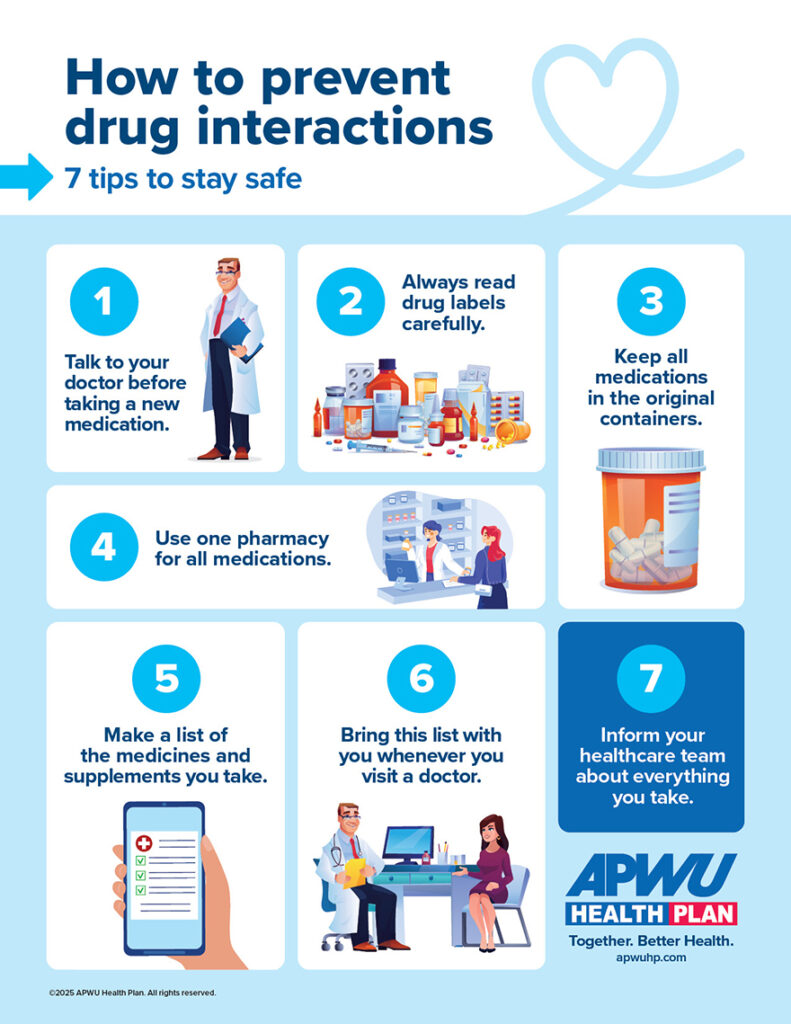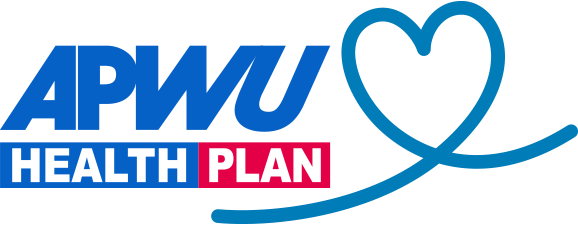Drug interactions affect how your medications work and can cause serious side effects. While anyone can experience a drug interaction, it’s more likely to occur if you take several medications or have a chronic health condition. Before taking any medication or supplement for the first time, talk to your doctor or pharmacist. A trained healthcare professional will make sure the medications you take are safe in combination with each other.
What is a drug interaction?
A drug interaction refers to unintended changes that occur when a medication reacts with another substance in your body or causes unexpected effects because of an underlying medical condition. Interactions can make a medication less effective or trigger side effects. In some cases, a harmful interaction will cause the drug to build up to toxic levels.
The medications you take have the potential to interact with a wide range of substances, including:
- Another prescription medication
- Over-the-counter drugs
- Vitamin pills and minerals
- Dietary and herbal supplements
- Food and beverages
- Alcohol
- Tobacco
- Cannabis and other recreational drugs
In some cases, a drug interaction is temporary. Your healthcare provider may need to prescribe a different medication or adjust the amount you take. Other times, an interaction can cause serious harm, so it’s important to know how to safely take medications and what to do if something unexpected occurs.
Different types of drug interactions
Drug interactions fall into three categories:
- Drug-drug interactions: One medication affects how another prescribed medicine, over-the-counter drug, vitamin supplement, or dietary supplement works.
- Drug-food/beverage interactions. A medication reacts with something you eat or drink.
- Drug-condition interactions. An underlying medical condition affects the way a medication works or a medication worsens the condition.
Drug-drug interactions
A new medication can change the way another drug works in your body. This includes two or more prescription drugs, two or more over-the-counter drugs, or a combination of prescription and over-the-counter drugs.
Medications can also interact with recreational drugs in unexpected ways.
When your body doesn’t break down a medication as fast as it should, the medication stays in your system for too long and can build up to a toxic level. This, in turn, can cause unwanted side effects.
In other cases, if a medication doesn’t stay in your body long enough, it may not work as well as it should.
Signs of drug-drug interactions include heightened side effects, reduced effectiveness, and increased potency.
Taking herbal and dietary supplements with other drugs
Before taking any supplement, talk to your doctor to make sure it’s safe for you.
- St. John’s wort can reduce the effectiveness of warfarin, statins, and some medications for heart disease and HIV. It can also cause negative side effects if you take a selective serotonin reuptake inhibitor (SSRI) for depression.
- Taking vitamin E with a blood-thinning medication such as warfarin can increase the risk of bleeding.
- Garlic extract can cause excess bleeding if you’re on warfarin or another blood thinner.
- Goldenseal can change the way your liver processes medications.
- Green tea supplements can react negatively with nasal decongestants and many cold and flu medicines.
Drug-food/beverage interactions
Healthy eating can help prevent many health conditions and reduce the need to take medications, but some foods, including wholesome fruits and vegetables, cause unexpected interactions with the ingredients in certain drugs.
Drug-food/beverage interactions can happen with prescription and over-the-counter drugs, including vitamins, herbal supplements, antacids, antidepressants, and statins.
Certain foods and beverages prevent your body from properly absorbing these medications and change how the active ingredients move through your system. Foods and beverages can also increase or decrease your metabolism, leading to side effects and serious complications. In some cases, foods and beverages will make it more difficult for your body to clear the medicine, allowing it to build up to toxic levels.
Mixing alcohol with some medications can cause critical issues with the liver, heart, or lungs and increase the risk of internal bleeding.
Common drug-food interactions
Depending on the medications you take, you may need to avoid certain foods:
- Grapefruit and grapefruit juice can interfere with some statins and blood pressure medications by changing how they break down in the body.
- Green leafy vegetables that are rich in vitamin K can stop the effects of the blood thinner warfarin.
- Dairy products don’t mix well with some antibiotics and can reduce the ability of tetracyclines to fight infections.
- Fruit juice can reduce the effectiveness of antibiotics such as penicillin.
- Licorice can increase the risk of toxicity if you take digoxin for congestive heart failure and abnormal heart rhythms. It can also reduce the effectiveness of blood pressure drugs and diuretics.
- Aged and fermented foods can interact with monoamine oxidase inhibitors (MAOIs), which are prescribed to treat depression.
Taking medications with food
Sometimes you need to take a medication with food or a specific type of food in order to ensure it works properly. Other times, you need to take a medication on an empty stomach. If you have any questions about a new medication or supplement, ask your doctor or pharmacist.
Drug-condition interactions
Medications can cause unexpected side effects if you have an underlying medical condition like heart disease, high blood pressure, diabetes, asthma, or glaucoma. Ibuprofen, nasal decongestants, steroids, and amphetamines are among medications that often cause problems.
Examples of conditions that interact with drugs include:
- High blood pressure: Avoid allergy medications that contain nasal decongestants as these medicines work by tightening blood vessels in the nose and sinuses.
- Asthma: Be careful about taking a beta blocker for high blood pressure as the medication could trigger an asthma attack.
- Glaucoma: Avoid taking antihistamines as they can raise the pressure inside your eyes.
- Liver disease: Avoid taking acetaminophen as it can build up to toxic levels in your liver and cause damage.
How to prevent drug interactions
Before you start taking a new medication or supplement, always ask your doctor or pharmacist if you should avoid any foods, beverages, supplements, or other drugs. For prescription drugs, read the label on the container and ask the pharmacist if you don’t understand something. For over-the-counter medicines, be sure to read the directions and warnings.
Don’t cut pills in half without first checking with your doctor or pharmacist as this may change the way the medicine works or alter the delayed-onset effect. And don’t mix medicine into hot tea or another beverage as the heat may decrease how well it works.
If you take several medications and supplements, keeping a calendar and following a routine can help you remember to take everything at the right time. You may find it helpful to use a pill box, but be sure to keep it out of the reach of children and away from pets.
Keep a list of the medications and supplements you take
A medication list can help you avoid drug interactions. In addition to the name of each drug or supplement, include the active ingredients, the amount you take, and why you’re on it.
For prescribed medications, list the name of your doctor and whether it’s a short-term or long-term maintenance medication (for example, a statin). Be sure to update your list whenever your medications change.
Give copies of the list to your primary care doctor and pharmacist, and carry a copy with you.
Always talk to your doctor before making any changes to your medications. If you miss a dose, experience new side effects, or don’t see the results you expected, talk to your doctor or pharmacist.
Online drug interaction checker
An online drug interaction checker that lets you search for drug interactions may be helpful, but it isn’t a substitute for talking to your doctor or pharmacist. Your doctor knows your medical history and can provide guidelines specific to you. It’s not easy to predict drug interactions, especially as your body changes over time.
If you have questions about drug interactions, ask your doctor or pharmacist
The most important step you can take to prevent drug interactions is to talk to your doctor or pharmacist before you take a drug or supplement for the first time. If you don’t understand the instructions for taking the medication — or if you have any questions or concerns — ask your doctor or pharmacist.

Sources
Cleveland Clinic, Drug interactions: What you should know
Johns Hopkins Medicine, Food-drug interactions


